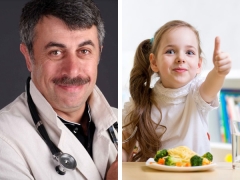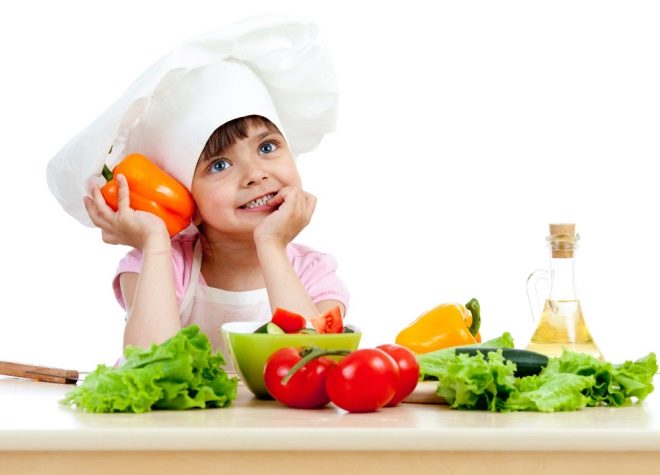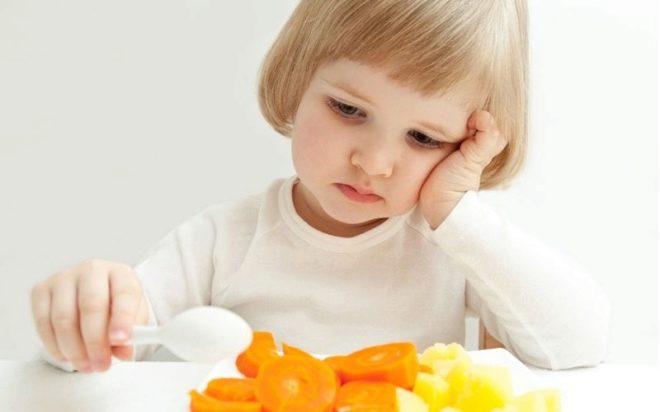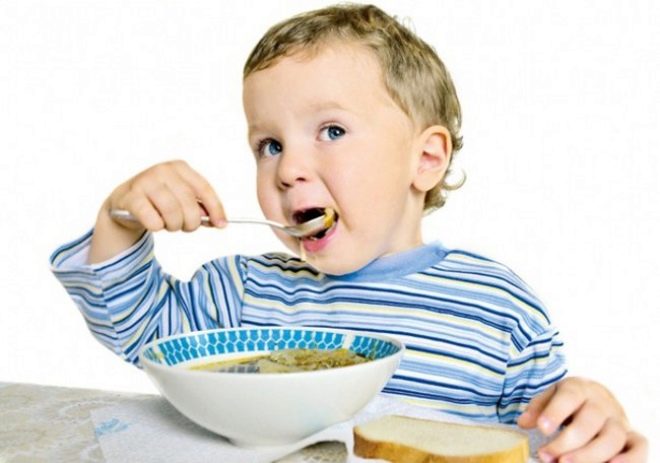Dr. Komarovsky about children's nutrition
The famous pediatrician considers the nutritional issues of children to be very important and does not welcome any parental experiments in this area. He says that an adult is free to eat as he pleases, and it doesn’t matter what he chooses for himself - raw food diet, separate meals, vegetarianism, fasting or something else. However, Komarovsky calls food experiments on children unethical and cruel behavior. Let's find out the attitude of a popular doctor to other nutritional problems of older children and ill children.
Lack of appetite
First of all, for all problems with the nutrition of the child, Komarovsky advises do not make a cult of food. Parents should not turn the question “how and how to feed a child?” Into the meaning of their own lives.
The well-known doctor directly connects the problem of poor appetite with the family’s wealth, as well as with the family’s lifestyle. He recalls that the appetite comes after the child spends enough energy. If the kid moves a little (for example, spends a lot of time on the lessons), is warmly dressed, walks a little, then he has little energy, which is manifested by reduced appetite.
From his own experience, Komarovsky noted that kids who have no appetite are either very busy or very lazy. It is easier for them to begin to persuade the baby, promise him gifts and try to feed him in another way than to walk and play with the baby in active games. In general, the well-known doctor emphasizes that the appetite indicates the readiness of the body to digest food, therefore, it is pointless to feed children without appetite.
Diet
The basis of the recommendations to feed the child according to the regime Komarovsky calls Pavlov's teachings, according to which when eating food at one time, the digestive juices begin to be produced by the right time, which improves digestion. However, this teaching does not take into account that it is not always possible to give the child food at the same time.
In addition, the popular doctor recalls that Pavlov used dogs for experiments, and their lifestyle is very different from children, because a great number of factors affecting appetite (for example, watching TV or the resulting deuce) act on modern children. And because Komarovsky recommends feeding children not by the hour, but taking into account the presence of appetite and ready-made food.
Refusal of food
Among the reasons for refusing food, the famous pediatrician names:
- Diseases of the mouth, intestines or respiratory system.
- Unsuitable physical characteristics of food (very hot or cold food).
- Inappropriate taste of food (bitter, salty, sour).
However, in most cases, Komarovsky associates this behavior with pedagogical and educational problems, when parents from an early age indulge the demands of children and are ready to restrain themselves in eating, but give the baby the most delicious and desirable things.
Snacks
Komarovsky calls this phenomenon, when parents in the intervals give babies sweets, fruits, cookies and other food, very frequent. However, a popular doctor considers snacking acceptable except for two situations:
- If the child has problems with appetite.
- If a child has a chronic infection in the oropharynx.
Sweet
Komarovsky calls sweet food a source of fast-available energy and pleasure. And if there is a child, where to spend this easily received energy, no obstacles in order to give the child sweetness, the famous pediatrician does not see.
However, he recalls that allergies to exotic fruits and chocolate are very frequent, and if a problem has appeared, these products should not be given in small quantities, but should be excluded from the diet for at least a year.
Soups
From his own experience, Komarovsky knows how popular the opinion is for our country that a child needs liquid and hot food at least once a day. soup. At the same time, a well-known doctor focuses parents' attention on the fact that borscht and soups are not eaten every day in dozens of countries, and medicine does not consider first courses to be mandatory in the diet. Whether there are soups or not depends solely on your habits and tastes, as well as on the amount of free time of the parents and their financial situation, since it is beneficial for finances and for time to cook the first dish for several days.
Nutrition for diseases
Before deciding whether food is necessary for a sick child, Komarovsky draws attention to 2 points:
- There are diseases for the treatment of which a certain diet is important. An example would be diabetes (limit sugar) or kidney disease (limit salt). Also, a special diet is needed for inflammation of the intestines, food poisoning, constipation, diseases of the pancreas and other pathologies of the digestive system.
- In case of any acute illness or exacerbation of chronic pathology, the appetite of most children is reduced.
According to the well-known doctor, loss of appetite for any disease is a typical sign indicating that the child’s food needs have decreased. And Komarovsky considers the right tactics to leave the kid alone and not force him to eat.
A child’s liver during illness is occupied by the synthesis of substances that neutralize bacteria and viruses, as well as the neutralization of toxins. And loading it additionally with the process of digestion is not worth it.
Here are the universal rules that Komarovsky recommends in the nutrition of sick children:
- First of all, take into account the appetite of the child.
- Do not force feed.
- Reduce portions, but offer food more often.
- Do not give any new products to the sick child.
- Choose a warm, lean, liquid and easily digestible food to feed a sick baby.
We advise you to watch the following video, in which Dr. Komarovsky talks about the many nuances of child nutrition.














